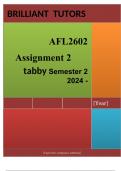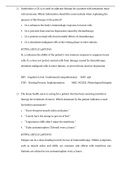BRILLIANT TUTORS
AFL2602
Assignment 2
tabby Semester 2
2024 -
[Year]
[Type the company address]
, Book
Indigenous Management Practices in Africa
AFL2602 Assignment 2 ENGLISH (COMPLETE ANSWERS) Semester 2
2024 - DUE r 2024 ; 100% TRUSTED Complete, trusted solutions and
explanations
QUESTION 1 African literature abounds stories of repression of children by
the head of the family as far as decision making that affects their lives is
concerned. Discuss this statement with reference to literary texts in your
African language. Do not copy direct from the study guide. Rephrase your
answer.
African literature often depicts the repression of children by the head of the family, especially
regarding decisions that significantly impact their lives. This theme is recurrent in various texts
and showcases the hierarchical structure within traditional African families where the head,
typically a father or elder, wields significant power and authority.
Key Points of Discussion:
1. Patriarchal Authority: Many African literary works illustrate a patriarchal family
structure where the father's word is law. Children are expected to obey without question,
and their opinions and desires are often disregarded. This dynamic is evident in numerous
stories, reflecting a cultural norm where the head of the family has the ultimate decision-
making power.
2. Cultural and Social Norms: The repression of children is often justified by cultural and
social norms that prioritize obedience and respect for elders. These norms are deeply
ingrained in the fabric of African societies and are portrayed in literature as central to
maintaining order and tradition within the family and community.
3. Educational and Marital Decisions: Literature frequently explores how the head of the
family controls crucial decisions regarding the education and marriage of children. For
instance, stories might highlight a father's decision to marry off his daughter to a suitor of
his choice, regardless of her wishes, or to determine his son's career path without
considering the child's interests or aspirations.
4. Conflict and Resistance: While many texts depict the acceptance of this repression,
others highlight the conflict and resistance that arise. Characters, particularly young
protagonists, often struggle against the imposed decisions, seeking to assert their
individuality and agency. These narratives underscore the tension between tradition and
modernity, and between authority and personal freedom.
5. Emotional and Psychological Impact: The emotional and psychological impact of such
repression on children is a recurring theme. Literature portrays the frustration,
helplessness, and rebellion that children experience when their voices are stifled. These






